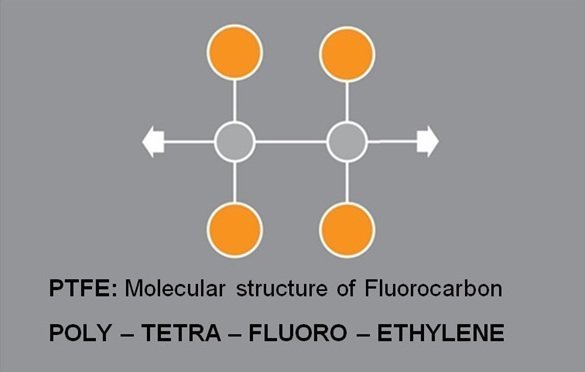PTFE
Wide application of polytetrafluoroethylene (PTFE) in food, chemical and electrical insulation industries

PTFE - polytetrafluoroethylene (PTFE)
Polytetrafluoroethylene (PTFE) is a polymer with a higher molecular weight than tetrafluoroethane. It is a thermoset material with no melting point that is processed through sintering. PTFE offers a number of interesting properties, including: Total chemical inertness, which makes it resistant to almost all chemicals. Very low coefficient of friction – currently the lowest coefficient of friction among industrial products. Any organic solvent has excellent dielectric properties; outstanding properties of fire resistance, i.e. no flame propagation. These properties are maintained almost unchanged in the temperature range between -80°C and 250°C with even higher peaks.PTFE is used for various applications in industrial, food, electrical and chemical fields. In the hydraulic-pneumatic sector, it is used to produce seals and wear strips. Because of its low density modulus, it is often combined with high-memory elastomeric components or metal springs to add energizing elasticity. PTFE is available as virgin or filled with different additives in different percentages. Common fillers include molybdenum disulfide, glass, carbon, graphite, and bronze, or a combination of each.
PTFE has excellent resistance to most chemicals and solvents and can work at high and low temperatures – up to 260 degrees Celsius. PTFE rods also have a very low coefficient of friction and are commonly used in food contact applications. PTFE rods have good thermal stability and good electrical properties, but are not suitable for wear applications and are difficult to bond together.
benefits
Very high chemical resistance
Wide temperature range – maximum service temperature of 260 degrees Celsius
Low friction and low adhesion
Resistant to radiation
Excellent dielectric performance
applications
Bearings, insulators and rollers, washers
PTFE tubes
PTFE tubes and rolls – suitable for making bushings, compressor rings, etc. Made of polytetrafluoroethylene PTFE – stable and resistant material, chemically inert, non-flammable with high dielectric strength.
Temperature range: -200 degrees Celsius / +260 degrees Celsius
pH: 0 to 14
Thermal conductivity: 0,25-0,69 W/mK
Some outstanding features
High thermal resistance
High resistance to chemical agents and solvents
High anti-stick properties
High dielectric properties
Low friction coefficient
Being non-toxic
UV resistance
Many applications of Teflon (PTFE)
PTFE (polytetrafluoroethylene) is more than just a non-stick coating on containers. It has become one of the main industrial applications worldwide. And for good reason. With excellent temperature range, chemical and corrosion resistance, and excellent electrical, non-stick and antimicrobial properties, PTFE products are capable of being converted into various components. Wherever moving, vibrating or rotating parts are required, PTFE wpml_nbsp will improve your production process by reducing friction, wear and energy consumption in many types of machinery.
Industrial applications of PTFE:
- Aerospace
- Chemical processing
- Construction
- industrial
- biology
- Oil and Gas
- Semiconductor
- Wiring and insulation
